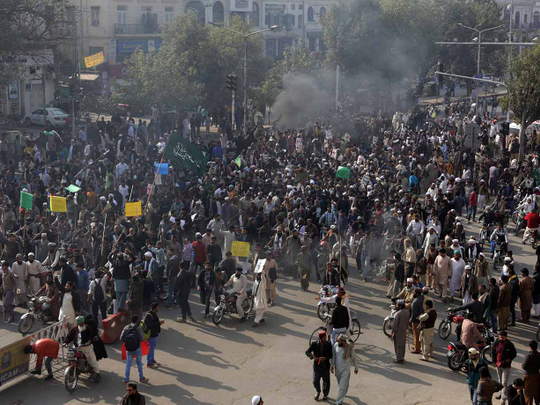
Islamabad: Pakistani government has authorised the powerful military to deploy troops to secure the capital Islamabad after violence broke out Saturday when security officials attempted to disperse an Islamist sit-in, the interior ministry said.
The request was made by Islamabad Capital Territory authorities, according to an interior ministry order, which said the federal government had authorised the deployment of "sufficient troops" to "control law and order" in the city until further notice.
Earlier, Pakistani forces clashed violently with hardline religious protesters in Islamabad Saturday, with at least one person killed, more than 130 injured and small demonstrations spreading to other cities after police cracked down on an Islamist sit-in.
As the violence intensified throughout the day officials ordered security forces to temporarily halt the operation, hours after roughly 8,500 armed police and paramilitary forces began their attempt to clear the protest.
"The operation is suspended," an Islamabad police spokesman told AFP Saturday evening, adding that some 4,000 security personnel remained in the streets. He could give no more details, and top security and police officials were not immediately available for comment.
It was not clear how many protesters remained. There had been roughly 2,000 as the operation began early Saturday, but AFP reporters said dozens more were arriving throughout the day.
Earlier, security forces fired tear gas and rubber bullets as the demonstrators blocked roads and burned police vehicles around the site of the sit-in, which has choked a main highway and virtually paralysed the capital since November 6.
At least one policeman was killed in the clashes, a police spokesman said, and an AFP journalist saw what appeared to be the body of at least one demonstrator lying in the street in the capital. Hospital officials said at least 139 people had been wounded, mostly security forces.
The protesters, from the little-known hardline group called Tehreek-i-Labaik Ya Rasool Allah Pakistan (TLYRAP), are demanding that Pakistan’s law minister Zahid Hamid resign over a hastily-abandoned amendment to the oath that election candidates must swear.
Demonstrators have linked it to blasphemy - a highly contentious issue in Muslim Pakistan - and claim the oath was softened to enable the participation of Ahmadis, a long-persecuted Islamic minority sect.
The demonstrations have piled more pressure on the beleaguered Pakistan Muslim League (PML-N) government ahead of a general election due to be held next year, with analysts and critics accusing it of bungling its response.
Alarmed residents
Fresh protests also sprung up in other cities Saturday. Police in Karachi said some 200 protesters had blockaded a major road in the southern port, with at least nine injured people - including three with gunshot wounds - brought to hospital, according to doctors.
Markets and shops were closing in the megacity, Pakistan’s commercial hub, as alarmed residents stayed inside while clerics called for more demonstrators to come and help protect the dignity of the Prophet Mohammed.
An AFP journalist in Lahore, the capital of Punjab province, said Mall Road, the main artery in the eastern city, had been closed by police due to protests, while a deployment of paramilitary Rangers was being sought by city officials. Smaller demonstrations were reported in other towns across the country.
As the clashes spread, Pakistan's powerful military chief phoned the prime minister Shahid Khaqan Abbasi to urge the situation be handled "peacefully", army spokesman Major General Asif Ghafoor said on Twitter.
General Qamar Javed Bajwa called for both sides to avoid violence "as it is not in national interest".
"We have tried every peaceful effort, but if a group does not agree then the government has to use force," interior minister Ahsan Iqbal told state-run PTV.
Pakistan's media regulator barred local TV channels from broadcasting live images from the scene, though protesters were still using Facebook Live and other social media to galvanise support across the country.
Bungled response
The protesters come from the Barelvi sect of Islam that has strong ties to Sufism, a mystical branch of the religion that is seen as moderate.
However the execution in 2016 of Barelvi follower Mumtaz Qadri - who assassinated liberal Punjab governor Salman Taseer over his stance on the country's blasphemy laws - led members of the group to take a more hardline stance against any moves to reform the legislation.
"These people already had a grudge against the government and the government just provided them the opportunity to vent out their anger," said political analyst Hasan Askari.
Authorities have hesitated to act against the sit-in, citing fears of violence as the demonstrators have vowed to die for their cause.
But their weeks of inaction have sparked the wrath of residents as well as Pakistan's judiciary, with the Supreme Court issuing a blistering statement earlier in the week and the Islamabad High Court threatening to hold government officials in contempt.
The Supreme Court had already dealt a severe blow to the PML-N by ousting its leader, former prime minister Nawaz Sharif, over a graft investigation in the summer.
Analysts said the government had allowed a minor issue to grow into a headline-grabbing and potentially dangerous situation.
Even before Saturday's clashes the sit-in had cost the life of an eight-year-old child whose ambulance could not reach a hospital in time due to the blocked roads.
"Politically driven procrastination has its own costs and this is what the government is paying," analyst Imtiaz Gul told AFP.
The government delays had "allowed all like-minded people to organise and prepare for the protests," he said, adding that whether or not the government is forced to ask for military aid "it has already become explosive".












